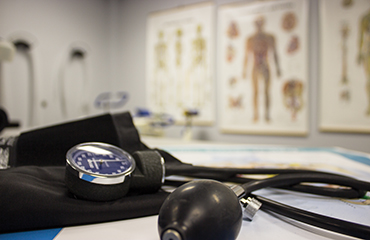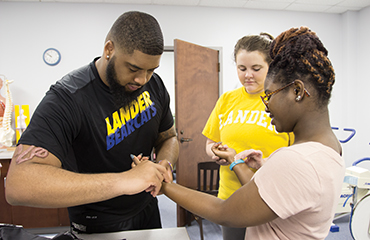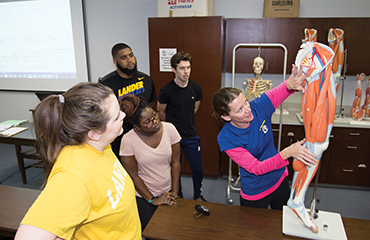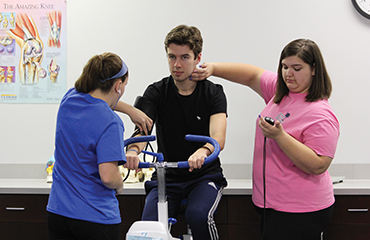
News coverage lately has revealed the irony that, although Americans are living longer, we are not as healthy as previous generations. We eat more and move less than our great-grandparents did, and the results can be measured by our waistlines, our blood sugar and our heart rate.
The good news is that we know how to combat these health conditions: improved diet and exercise can undo much of the damage our bad habits have brought on. The even better news is that Lander University is turning out exercise science graduates who are armed with knowledge and skills to help people regain their health.
Lander's signature exercise science program is one of the university's largest degree programs, and it is also one of the fastest growing, according to Dr. Gina Barton, professor of physical education and exercise science and chair of the Department of Physical Education and Exercise Studies.
She can think of several reasons why. "Exercise is something that every person needs to do to stay healthy and happy," Barton says.
But in addition, exercise and physical activity nurture a sense of community - and that's something students are drawn to. "Exercise can bring groups of people together in an inclusive environment," she explains.
A community is exactly what has developed among Lander's program. As more students choose to study exercise science, the program has become more selective - now requiring a 2.75 grade point average to even be considered - and has brought on more faculty to meet the student demand.

The program, its expanded faculty and their expertise attract students who want to study a variety of exercise- and health-related fields, including physical or occupational therapy, cardiac rehabilitation, fitness and conditioning and other concentrations. In addition to these subjects, Lander's exercise science degree incorporates courses in human physiology and biochemistry, fitness assessment and original research. In fact, Lander's exercise science students study it all.
"In exercise science, it is really important to develop a diverse skill set and understand how exercise works for everyone, from an elite athlete to a geriatric patient with chronic heart failure," explains Dr. Jenny Bond, associate professor of physical education and exercise studies, and director of internships.
For this reason, Lander's exercise science program is built upon a broad foundational structure of coursework that incorporates experiential learning along the way, and one that nurtures community among faculty and students through small class sizes and faculty-student research.
"I enjoy the practicals and the research. There's a lot of different areas of study within the degree," such as anatomy, health and nutrition, says Ross Catley-Davies, a senior from Kenilworth, England. A member of the men's soccer team, Catley-Davies plans to go on to medical school after Lander, and the exercise science program has provided "a background for everything in medicine."
While they are building their foundation in diverse subjects, students also progress through the program's observational courses, service-learning and internships.
Their professors, Catley-Davies and his classmates explain, are "dedicated, energetic and knowledgeable." With the faculty's input and supportive guidance, the students specialize their studies to point them in the direction of their career.
"The faculty are not only experts in the field but are passionate about teaching and working with students," Bond says. "We have developed a family atmosphere that students are drawn to, which makes for a productive work environment, for both students and faculty."

In the final year of studies, Lander University's exercise science program kicks into high gear, and students complete 200 hours of supervised internships in areas of the students' particular interest, from cardiac rehabilitation to physical therapy to sports teams. In fact, service-learning is an important aspect of the program, with students serving at Self Regional Hospital and Sports Medicine Clinic, the Wofford Strength and Conditioning program and the YMCA, among other clinics farther afield.
Haley Robertson, of Greenwood, is one of the seniors completing an internship this spring in cardiac rehab. "The program definitely prepares you for your career. We get to do a lot of hands-on work, and I recognize and use a lot of the content from clinicals and physiology lab in my internship," she explains. "It makes me feel more comfortable."
"Hands-on experiential learning is so important in exercise science," Bond says. "Our students need to be great at working with people in the real world and develop excellent exercise testing and training skills. By providing all these different opportunities for hands-on learning," she continues, "we ensure that our students grow into competent and caring professionals."
And, of course, becoming a competent and caring professional is the whole point of it all. With their degree in hand, Lander students can enter directly into research-driven graduate programs and onward into health care, biomechanics, sports nutrition and sports medicine.
If they're ready to launch their professional careers, Lander's exercise physiology graduates will be prepared to work in corporate environments as wellness coordinators, for example; for public and nonprofit entities, such as hospitals; and in the private sector as personal trainers and healthy lifestyle advisers.
That flexibility is what attracted senior Kristen Ollison, of Columbia. "With this degree, you can go into research, health care, teaching or working with athletes out on the field - there's just so much versatility."
 The Bureau of Labor Statistics estimates that the job outlook in exercise- and physiology-related careers is strong and will continue to grow at about 11 percent from 2014 to 2024, which is faster than average. Health care management of the aging Baby Boom generation is already ramping up, with insurance companies and health care providers offering exercise programs, nutrition counseling, personal training and health coaching to Baby Boomers who are entering their 60s and 70s.
The Bureau of Labor Statistics estimates that the job outlook in exercise- and physiology-related careers is strong and will continue to grow at about 11 percent from 2014 to 2024, which is faster than average. Health care management of the aging Baby Boom generation is already ramping up, with insurance companies and health care providers offering exercise programs, nutrition counseling, personal training and health coaching to Baby Boomers who are entering their 60s and 70s.
Whether they are directing their own fitness centers, attending clients as personal trainers or working in higher education as strength and conditioning coaches or faculty, Lander's exercise science grads are putting their degrees to work and making Lander proud.
This story appears in the Spring 2017 issue of Lander Magazine